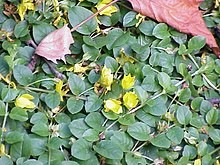| Lysimachia nummularia | |
|---|---|

| |

| |
| Conservation status | |
 Least Concern (IUCN 3.1) | |
| Scientific classification | |
| Kingdom: | Plantae |
| Clade: | Tracheophytes |
| Clade: | Angiosperms |
| Clade: | Eudicots |
| Clade: | Asterids |
| Order: | Ericales |
| Family: | Primulaceae |
| Genus: | Lysimachia |
| Species: | L. nummularia |
| Binomial name | |
| Lysimachia nummularia L. | |
Lysimachia nummularia is a species of flowering plant in the primrose family Primulaceae. Its common names include moneywort, creeping jenny, herb twopence and twopenny grass.
Description
It is a vigorous, prostrate, evergreen perennial growing to 5 cm (2 in) in height and spreading rapidly and indefinitely by stem-rooting. It has rounded leaves arranged in opposite pairs, and cup-shaped yellow flowers 2 cm in diameter, in summer. It is particularly associated with damp or even wet areas, though in cultivation it will tolerate drier conditions. It is hardy, surviving lows of −15 °C (5 °F) (RHS H5).
Distribution
It is native to Europe, but has been introduced to North America, where it is considered an invasive species in some areas. It aggressively spreads in favorable conditions, such as low wet ground or near ponds. It is moderately difficult to remove by hand pulling. Any tiny piece left behind will regrow.
Etymology
The Latin specific epithet nummularia means "like a coin", referring to the shape of the leaves; hence the common names, such as "moneywort", which also references coins.
Cultivation
The cultivar 'Aurea' (golden creeping Jenny) It is cultivated as an ornamental plant, for groundcover where the range of its growth can be limited. It is also suitable as a bog garden or aquatic marginal plant. has yellow leaves, and is somewhat less aggressive than the species. It has gained the Royal Horticultural Society's Award of Garden Merit.
Chemistry
The plant contains a number of phenolic acids.
References
- Lansdown, R.V. (2014). "Creeping-Jenny, Lysimachia nummularia". IUCN Red List of Threatened Species. 2014: e.T167913A42403938. doi:10.2305/IUCN.UK.2014-1.RLTS.T167913A42403938.en. Retrieved 15 February 2022.
- ^ "Lysimachia nummularia". RHS. Retrieved 28 June 2021.
- RHS A-Z encyclopedia of garden plants. United Kingdom: Dorling Kindersley. 2008. p. 1136. ISBN 978-1405332965.
- Harrison, Lorraine (2012). RHS Latin for gardeners. United Kingdom: Mitchell Beazley. p. 224. ISBN 9781845337315.
- "Lysimachia nummularia 'Aurea'". Missouri Botanical Garden. Retrieved 11 July 2021.
- "Lysimachia nummularia 'Aurea'". RHS. Retrieved 28 June 2021.
- Luczak, S; Swiatek, L; Daniewski, M (1989). "Phenolic acids in herbs Lysimachia nummularia L. And L. Vulgaris L". Acta Poloniae Pharmaceutica. 46 (4): 381–5. PMID 2635807.
External links
| Taxon identifiers | |
|---|---|
| Lysimachia nummularia |
|